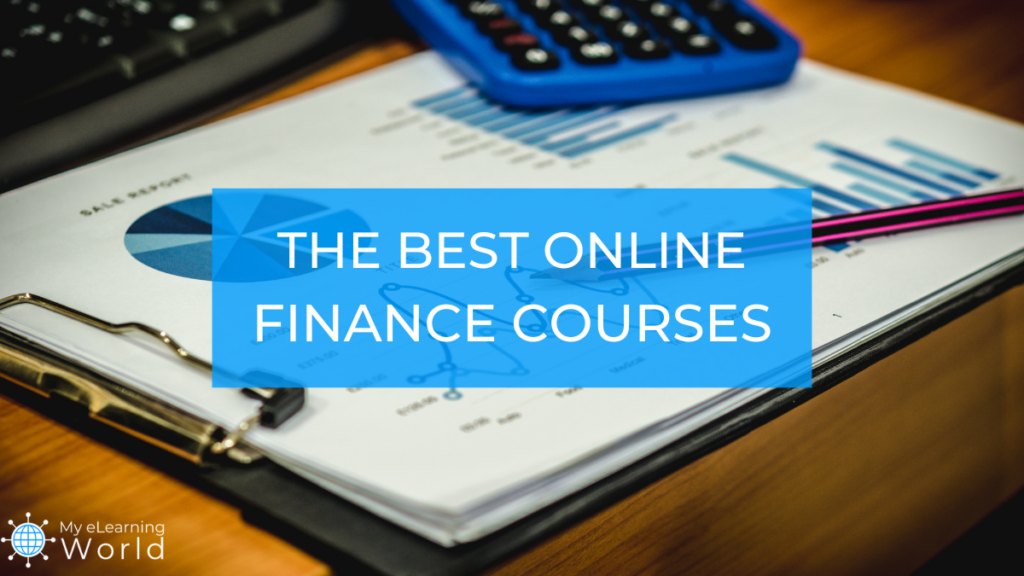With the best online finance courses, you can gain valuable knowledge and skills to help you succeed in your financial career.
In the rapidly evolving landscape of finance, staying ahead of the curve has never been more important.
Whether you’re a finance professional seeking to sharpen skills or a curious learner eager to explore this dynamic field, there are online courses out there that can help you reach your goals.
Online finance classes let you learn at your own pace, from the comfort of your home or office, and at a fraction of the price of traditional, in-person courses.
With courses covering everything from financial analysis and budgeting to investments and risk management, you can upskill in any area. You can even take a course in personal finance to gain insights into managing your own money.
We’ve reviewed and ranked the best online finance courses based on a number of key factors, including curriculum quality, student ratings, instructor credentials, price, and more.
Disclosure: Some of the links in this article are affiliate links, meaning at no additional cost for you, we might get a commission if you click the link and purchase.
What are the Best Online Finance Courses?
Here are our picks for the top finance courses you can take online in 2023…
1. Harvard VPAL FinTech (GetSmarter)
 Harvard VPAL FinTech Online Course | Financial Technology Certificate - GetSmarter
Harvard VPAL FinTech Online Course | Financial Technology Certificate - GetSmarter
Step beyond the current FinTech landscape and get ready for future financial services priorities with this excellent online course.
Price
$2,800 (payment plans available)
By revolutionizing the financial industry and creating new job opportunities, Fintech is a rapidly growing field that has disrupted traditional banking systems. If you’re interested in this innovative industry, the Harvard VPAL Fintech online short course is the perfect way to gain in-depth knowledge.
This eight-week online finance course provides a detailed overview of Fintech and covers the latest technologies like blockchain, artificial intelligence, and machine learning. Participants will gain insights into the industry’s regulatory and legal environment, as well as the ethics of Fintech.
During the course, you will have the opportunity to learn from Harvard Business School faculty, as well as industry experts and thought leaders. You will also collaborate with fellow professionals from around the world, building a network of like-minded individuals.
Overall, this Fintech course is designed for anyone wanting to understand this new, thriving industry more deeply. Whether you are an experienced professional or a newcomer, this course can help you advance your career in finance.
Enroll now and kickstart your career in Fintech.
2. Oxford Executive Finance Programme (GetSmarter)
Price
$2,912 (payment plans available)
Discover the practical knowledge and skills required to understand the finances of any organization and make informed strategic decisions through the Oxford Executive Finance Programme from Saïd Business School.
The program is designed to empower non-financial business leaders, senior executives, managers, and business professionals with the financial proficiency to participate in critical discussions and strategic decision-making at an executive level.
During the program, you will explore corporate finance in terms of capital structure, taxation, and bankruptcy and investigate funding tradeoffs through an analysis of debt versus equity.
You’ll also gain insights into current industry debates and discover the elementary topics that are changing practices in the fast-moving world of finance, such as corporate governance and environmental, social, and governance (ESG) factors.
Upon successful course completion, earn a certificate of attendance from Saïd Business School, University of Oxford. This certificate can be a valuable addition to your professional portfolio and increase your career prospects.
With its six-week duration, it is ideal for busy business professionals.
3. Financial Modelling and Analysis (GetSmarter)
Price
$763 (payment plans available)
Discover the fundamentals of financial modeling and forecasting in this short course from the University of Cape Town. With a focus on Excel-based modeling, you’ll learn how to create models that reflect the financial performance of assets, stocks, or investments.
Guess what’s more interesting? Once you get the hang of financial models, you can also integrate AI into them and make your analysis more intricate and accurate. Remember– AI is the future and integrating new variables into financial models through AI is undoubtedly a highly sought-after skill.
Expert faculty will guide you through building revenue models, realistic forecast assumptions, and forecasting historical data into the future, all of which are critical skills for financial analysts.
This course is ideal for existing and aspiring financial analysts seeking to hone their quantitative skills and excel in the field. Upon completion, you’ll have gained practical and in-demand financial modeling skills to apply to various business types.
Plus, you’ll receive a certificate of completion from Africa’s leading university and access to 2U’s Career Engagement Network. This community provides exclusive resources to help you climb up the corporate ladder.
Check out our GetSmarter review to learn more about this online course platform.
4. Python for Finance: Investment Fundamentals & Data Analytics (Udemy)
Price
Available with Udemy’s Personal Plan, starting at $16.58/month
Unlock your potential as an emerging data scientist with Python and build solid financial acumen. This online course will teach you to code in Python, work with its conditional statements, functions, sequences, and loops, and use scientific packages like NumPy.
Be prepared to learn how to use Pandas’ data analysis toolkit to perform in-depth investment analysis, build investment portfolios, and calculate the risk and return of individual securities and investment portfolios.
The course will also cover best practices for financial data, univariate and multivariate regression analysis, and the Capital Asset Pricing Model. Takeaways include comparing securities in terms of their Sharpe ratio and performing Monte Carlo simulations. Moreover, you’ll learn how to price options by applying the infamous “Black Scholes formula.”
Upon completing this course, you’ll have a strong foundation in Python programming and financial analysis. You will be well-equipped to pursue a career as a data scientist or developer in the finance industry.
5. The Complete Financial Analyst Training & Investing Course (Udemy)
Price
Available with Udemy’s Personal Plan, starting at $16.58/month
The course covers everything from portfolio management and risk management to IPOs and monetary policy. You’ll learn to build financial models, analyze financial statements, and value companies using different methodologies such as P/E, P/R, and discounted cash flow (DCF).
It also includes Excel-based templates that help you create financial statements from scratch, manage a portfolio, and value companies. Additionally, you’ll master the art of how to pitch long and short ideas to portfolio managers and identifying crucial aspects to make better investment decisions.
The course is suitable for anyone interested in becoming a financial analyst or advancing their career in finance. Instructor, Chris Haroun, is an experienced finance professional who has worked at Goldman Sachs, hedge funds, and venture capital firms. The good news is you can avail of 81% off on the course price.
6. Investment and Portfolio Management Specialization (Coursera)
Price
Investors of all types face similar issues regarding investing: how to meet liabilities, decide where to invest, and determine how much risk to take. This Coursera Specialization offers the essential skills of portfolio management and personal investing to help you tackle liquidity and solvency problems.
Consisting of various courses, it begins with an overview of global financial markets and the instruments that define investment opportunities today. You will learn how to create optimal portfolios that have minimal risk, as well as how to deal with the behavioral biases and irrational behaviors of buyers and sellers in the markets.
Additionally, you will explore the best practices in portfolio management, systematic and unsystematic risks, performance evaluation, and current investment strategies. Throughout the Specialization, you will learn the theory and real-world skills necessary to design, execute, and evaluate investment proposals that meet your financial objectives.
Upon completing the Capstone Project, you will have honed your analytical tools, quantitative skills, and practical knowledge, which are crucial for long-term investment management success.
Stay calm if too many technical terms are haunting you. The program will guide you through all the essential concepts and terminologies necessary to become proficient in portfolio management.
7. Introduction to Corporate Finance (Coursera)
Price
The Wharton School of the University of Pennsylvania is widely recognized as one of the world’s premier financial institutions. This introductory finance course will provide an overview of essential financial concepts and analytical tools needed to make sound financial decisions.
This course gives you a virtual tour of the corporate world’s dynamic and ever-changing financial landscape.
Join it to explore the fascinating world of finance. Learn about concepts such as the time value of money, risk-return tradeoff, WACC (Weighted Average Cost of Capital), interest rates, mortgage plans, asset leasing, capital budgeting, discounted cash flow (DCF) models, net present value (NPV), internal rate of return (IRR), hurdle rate, and payback period.
By completing this course, you will be well on your way to acquiring the essential skills and knowledge needed to thrive in the finance industry. So come on board, fasten your seatbelts, and get ready for a thrilling ride through the world of finance!
8. Advanced Topics in Derivative Pricing (Coursera)
Price
This course is designed to give you an in-depth understanding of equity derivatives and how they are used in financial engineering. The course is divided into three modules: Part I, Part II, and Credit Derivatives and Structured Products.
In Part I, you will learn about the Black-Scholes model and how to derive Greeks. These indices measure the sensitivity of option value to variables like stock price and volatility. You will also explore risk management, hedging, and implied volatility, a crucial link between market option prices and options prices under the Black-Scholes framework.
In Part II, you will continue exploring implied volatility and how to use them to price derivatives such as digital options and range accruals. You will also learn how to obtain the risk-neutral density of the terminal stock price distribution from option prices. In practice, you will also explore joint distributions of two securities and dynamic replication.
In Credit Derivatives and Structured Products, you will delve into topics like Credit Debit Obligation (CDO) and the Gaussian Copula model, which can be used to compute the portfolio loss function. You will also learn about synthetic CDO, portfolio pricing, and risk management.
Finally, Other Applications of Financial Engineering covers real options, a valuation method for highly volatile underlying assets with many uncertainties. Using natural gas and electricity-related options as an example, you will learn about dynamic programming in real options.
This course will equip you with the latest knowledge and skills to prevent speculation in financial transactions and analyze derivative markets like a pro!
9. Finance for Everyone: Smart Tools for Decision-Making (edX)
Price
It is an introductory course offered by the University of Michigan on the edX platform. The course is designed to provide learners with the fundamental concepts of finance and equip them with the essential tools needed to make smart financial decisions in both personal and professional contexts.
Throughout the course, you will explore various financial concepts and tools, including the time value of money, risk and return, portfolio theory, and the capital asset pricing model (CAPM). The course also covers practical financial decision-making skills such as budgeting, forecasting, and financial statement analysis.
In addition, the course emphasizes the importance of ethical decision-making and helps learners understand the ethical implications of their financial decisions.
By the end of this course, you will have a solid understanding of finance and the ability to apply financial concepts and tools to make better-informed decisions. Whether you are an aspiring entrepreneur, a finance professional, or simply interested in understanding finance better, this course will provide you with the knowledge and skills needed to succeed.
10. Basics of Financial Technology (Alison)
Price
Free
Are you an aspiring entrepreneur struggling to secure funding for your new venture? Look no further than this course! Even without prior knowledge of finance, economics, or accounting, you’ll learn everything you need about financing options, valuations, and term sheets.
You’ll gain a thorough understanding of the capital structure, early-stage versus later-stage financing, and how to develop a winning investor pitch. Plus, you’ll explore essential questions like when to raise capital from external sources, fundraising options, and how to perform company valuations.
This course will equip you with the knowledge to make informed financial decisions for your business and give you the tools to communicate with investors and secure the funding you need effectively.
In essence, this course will teach you all about raising capital from various sources and devising an optimal capital structure.
Say goodbye to common mistakes that limit the effectiveness of your pitch, and learn how to ‘get to the close.’ Whether you’re a new entrepreneur or a seasoned innovator, this course will provide you with the skills and knowledge needed to secure funding for your new venture.
A Final Word on the Best Online Finance Courses
With so many great online finance classes, you can easily and conveniently learn how to manage finances and make the most of your resources.
The classes above cover a range of finance topics, offering plenty of options for everyone from novice to experienced financial managers.
These courses are an excellent way to get ahead in your financial career, and can be taken from the convenience of your own home.
Have any questions about our guide to the top finance courses online? Let us know by commenting below.


